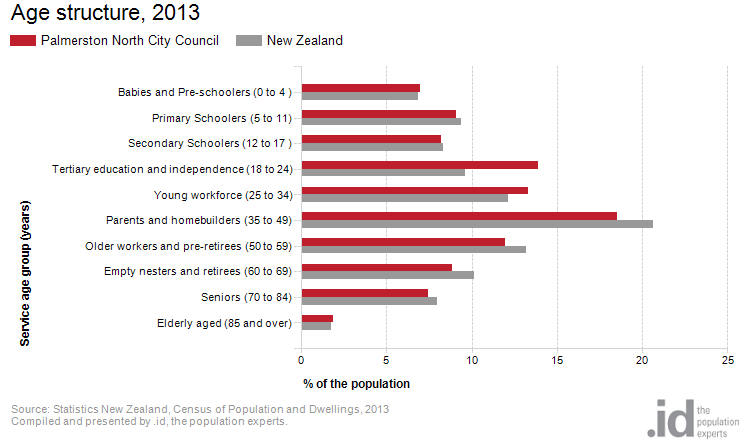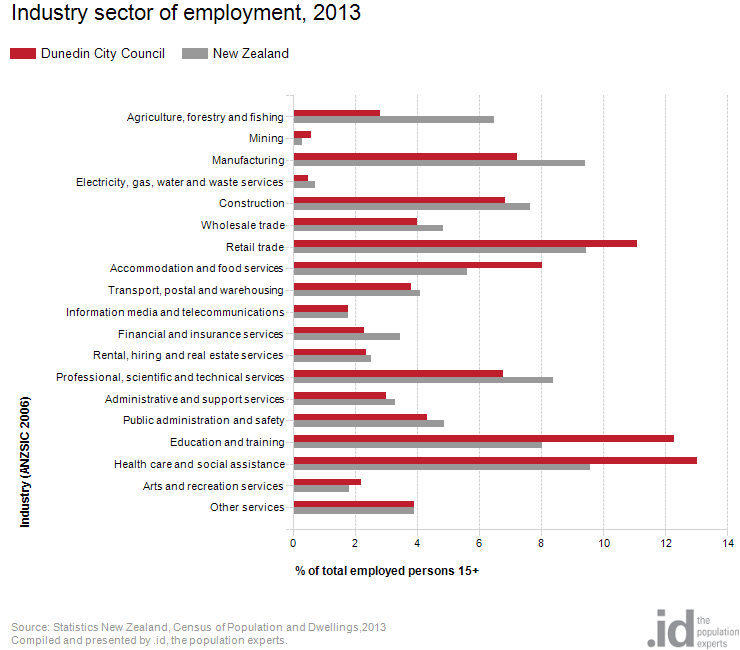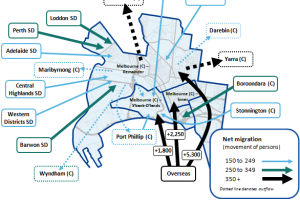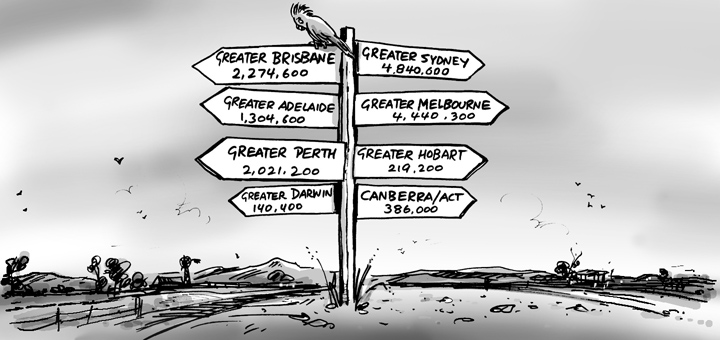How do universities affect our population, housing and industries? University is a very special time of life for most… and some of us keep going back! Universities are also special for the city they are part of as they have a major influence on the economic and social life of a place. This is a tale of two small university cities in New Zealand – Dunedin and Palmerston North. Dunedin’s estimated population stands at 123,500.
A quick glance at the Dunedin’s age structure charts introduces the profound demographic impact the Otago University has on the city.
 Palmerston North (having Massey University as its leading tertiary institution) with a smaller population of 83,500 shows the same domination of tertiary student age cohorts but in the other age cohorts the city reveals a very different character. For example Palmerston North has a much higher proportions of babies and preschoolers in comparison to Dunedin, which has one of the lowest percentages of under 5s in New Zealand.
Palmerston North (having Massey University as its leading tertiary institution) with a smaller population of 83,500 shows the same domination of tertiary student age cohorts but in the other age cohorts the city reveals a very different character. For example Palmerston North has a much higher proportions of babies and preschoolers in comparison to Dunedin, which has one of the lowest percentages of under 5s in New Zealand.

Interestingly the domination of tertiary students in both places drives relatively low median age figures. Palmerston North has the 3rd lowest age median in New Zealand (34 years) and Dunedin 7th with 37 years. The business of a university not only attracts young people to a place but also has a huge impact on the economy of both places. Education becomes a central employer in the area. Employment by industry figures for Dunedin confirm the value of the university, with the education and training sector contributing one in eight jobs. Most importantly the number of jobs in this sector increased by just over 1000 jobs between 2006 and 2013. That’s a big deal in city where very few other industries registered an increase during that time.

By comparison Palmerston North has around the same proportion of people employed in the education and training related industry (i.e. 12% c.f. 12.3% in Dunedin) but they have experienced a comparatively smaller increase with just 315 more jobs in the education area between the last two censuses. 
Not surprisingly the universities also have an impact on typical household makeup with both cities registering high proportions of group households. Dunedin, famous for the centralised nature of its student flatting (that’s renters for those Australian’s reading this) stock* (think Castle and Clyde Street ughhh!), leads the way with 7.5% of all households as group households. By comparison Palmerston North has lower numbers at 6%. The New Zealand figure is just 3.9%. The same comparisons can be made when looking at the influence of the Waikato University on Hamilton, and as the home cities get larger, the impact softens. You can see this in Victoria in Wellington City and Canterbury in Christchurch.
But one thing is sure, all the university cities benefit from the exodus of young adults experienced by other rural towns and cities in New Zealand. * … where flatting “is an experience in itself with students fighting to sign notorious, warm or location based flats” (www.dunedinnz.com). Dibs on the warm flats!

From Otago Daily Times (http://www.odt.co.nz/)

From Dunedin Flat Names Project (http://dunedinflatnames.co.nz/?attachment_id=1166). The tagline of the site says, “Creating a sense of identity”

















